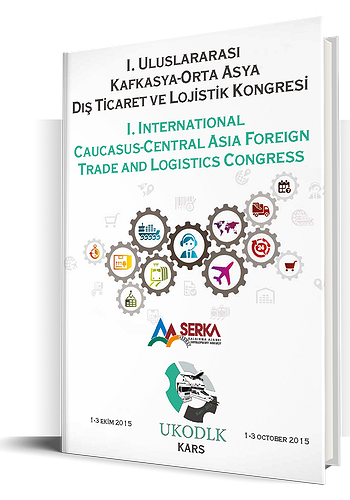
Ulaştırma ve Lojistik Kongreleri
- Türkçe
- Tam Metin
- 2015
Türkiye’nin Dış Ticaret Yapısına Gümrük Birliği Anlaşmasının Etkileri
Ahmet Ay
Prof. Dr., Selçuk Üniversitesi, Konya, Türkiye
Gökhan Akar
Öğr. Gör., Selçuk Üniversitesi, Konya, Türkiye
Tuba Akar
Arş. Gör., Karamanoğlu Mehmetbey Üniversitesi, Karaman, Türkiye
Türkiye’nin 1996 yılında Gümrük Birliğine dahil olması bu entegrasyonun etkileri üzerinde yoğunlaşmaya neden olmuştur. Türkiye ekonomisi açısından bu etkilerden en önemlisinin dış ticaret yapısı üzerinde olduğu söylenebilir. Hacim olarak genişleyen ve bileşim yönünden değişen dış ticaret, uyumlaştırılan teknik mevzuat, ticaret politikaları ve kurumsal yapılar Türkiye ile Avrupa Birliği arasındaki ekonomik bütünleşmeye ivme kazandırmıştır. Türkiye ekonomisinde dışa açık, ihracata dayalı büyüme modeli benimsenmesi ve 2001 yılında yaşanan krizle birlikte yurtiçindeki firmaların dış pazarlara açılma isteği ihracatı daha da önemli hale gelmiştir. Ancak ithalatın ihracata göre daha yüksek oranlarda artması, ithalata bağımlı bir ihracat yapısı ihracattan beklenen etkinin görülmesini engelleyebilir. İhracatın artmasındaki bir diğer faktör de dış ticarette öne çıkan sektörler ve temel pazar niteliğindeki ülkelerdir. Çünkü dış talepteki daralmalar ihracat gelirlerinde düşüşe ve istikrarsızlığa neden olabilecektir. Bu çalışmanın amacı, Gümrük Birliği Anlaşmasından sonra Türkiye’nin ihracat ve ithalat yapısındaki değişimi incelemektir. Elde edilen sonuçlar araştırmanın sonuç kısmında değerlendirilerek geleceğe yönelik bir politika önerilecektir.
Anahtar Kelimeler: İhracat, İthalat, Dış Ticaret
The Effects of Customs Union Agreement on Foreign Trade Structure of Turkey
Incorporation of Turkey to Customs Union in 1996 caused to concentrate on the effects of this integration. From the point of Turkish economy, it can be said that the most important one of these affects is on the structure of foreign trade. Foreign trade that expands in volume and changes from the aspect of composition, harmonized technical legislation, trade policies, and institutional structures brought acceleration in the economic integration between Turkey and European Union. In Turkish economy, the adoption of outward oriented and export - oriented growth model and, together with the crisis experienced in 2001, the desire of domestic firms to expand to the foreign markets made the export more important. However, the increase of import in higher rates, compared to export and an import oriented export structure may prevent to see the effect expected from the export. Another factor in the increase of export is the sectors becoming prominent in the foreign trade and countries in quality of the main market, because contractions in the foreign trade will be able to cause the fall in the export incomes. The aim of this study is to examine the variation in the import and export structure of Turkey after Customs Unions Agreement. In the section of Conclusion of the study, evaluating the results obtained, a policy toward future will be suggested.
Keywords: Foreign Trade, Export, Import

I. International Caucasus-Central Asia Foreign Trade and Logistics Congress Proceeding Book
E-ISBN:
Sayfa: 411-426

Bu çalışma, kullanan kişilere orjinal çalışmadan alıntı yaptıkları sürece, çalışmayı dağıtma, değiştirme ve üzerine çalışma hakkı tanıyan Attribution 4.0 International (CC BY 4.0) lisansı ile lisanslanmıştır.
İletişim
İstanbul Üniversitesi Ulaştırma ve Lojistik Fakültesi
İ.Ü. Avcılar Kampüsü 34320 Avcılar/İstanbul
ulk@istanbul.edu.tr
+ 90 (212) 440 00 00 - 19200


